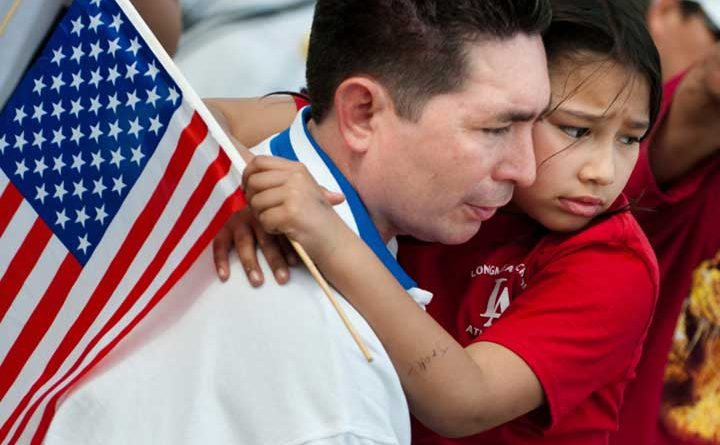Confused About ‘Public Charge’? Here’s What You Need to Know.
[Update 3/11/2021: The Trump Administration’s 2019 public charge rule is permanently blocked, nationwide. DHS/USCIS will follow the policy in the 1999 Interim Field Guidance. Under this policy, it is safe for immigrants and their families to access health, nutrition, and housing programs for which they are eligible.]
Editor’s Note: This post was originally published in October 2018. Since then, the Trump Administration has announced its finalized “public charge” rule. Please see Supporting Immigrant Families in the Age of Fear and Loathing for updated information on the rule.
This week the Trump administration released a proposed rule to change how the use of public benefits may affect individuals’ ability to obtain permanent legal status. This proposed “public charge” rule could force immigrant families to choose between either getting a green card or accessing support for their family’s health care, nutrition, and housing. Learn more: See FAQs from ProtectingImmigrantFamilies.org or watch a video overview. To get all your questions answered, attend a Public Charge 101 Training Webinar (on either October 17 or 31 at 10:00am).
Do you work with immigrant families who are concerned about this proposal? See How to Talk About Public Charge With Immigrants and Their Families. And here are resources from First 5 California for immigrant families experiencing trauma related to family separation and other anti-immigrant policies.
LA Best Babies Network joins our partners First 5 LA (along with other First 5’s, First 5 California, and the First 5 Association), Maternal and Child Health Access, the L.A. County Department of Public Health, and others in opposing the proposed change to the “public charge” rule. See the official statement and its 1,500+ signatories.
Important: This change is still just a proposal, so you and your organization can submit comments, which must be considered before the rule is adopted. See below. At the very bottom is a collection of related articles and resources.
The following is adapted with permission from the MCHA Advocate, a newsletter from our friends at Maternal and Child Health Access. Subscribe to MCHA’s mailing list here.
The Public Charge Notice of the Proposed Rule Making has been published in the Federal Register and the public comment period is finally open for submissions. Public comments will be accepted through December 10, 2018.
What should advocates do to fight the proposed public charge rule?
The Protecting Immigrant Families, Advancing Our Future campaign, a project of the Center for Law and Social Policy (CLASP) and the National Immigration Law Center (NILC), is working with advocates across the country to fight back.
We invite you to express your concern in individual or organizational public comments. Public comments are important as they must be reviewed, and they help build a record against this shameful action. Regulations are not considered specific legislation. Submitting comments on a proposed rule making that would impact your work is a permissible advocacy activity your organization could engage in. If your organization has questions, check with your funder or consult the Council on Foundations’s Rules of Advocacy and Lobbying, or Bolder Advocacy‘s free technical assistance. You can also send comments as an individual.How should public comments be submitted?
Use this public comment form. What should be included in public comments?
- It is better if you speak in your own voice rather than submit a pre-populated template comment. If comments are the same, multiple comments will be counted as one, which is less helpful.
- Explain the impact that this proposed public charge rule would have on you, your loved ones, or the community you serve.
- Don’t propose changes to the proposed rule. Simply oppose the ENTIRE proposed new rule.
- If you include cite studies or data, be sure to attach those documents to your comment.
For more detailed guidelines for submitting public comments, please follow this Protecting Immigrant Families Comment Guidelines document.
What information is most helpful for people who are concerned about public charge?
The most important thing for people to know is that nothing has changed. And if anything does change, anyone affected by the rule change will have 60 days after the rules are finalized (after this initial 60-day comment period) to disenroll from any programs that would affect their immigration status.
BOTTOM LINE: NO ONE SHOULD DROP THEIR BENEFITS OR DECIDE AGAINST ENROLLING IN BENEFITS BECAUSE OF THIS PROPOSED RULE CHANGE. They should use all of the benefits they are entitled to until the time comes when it may affect their immigration status and they might have to decide whether or not they should keep or drop certain benefits.
What should immigrant families do if they want to take action against this rule change?
Immigrant families who are interested in submitting their own story about how this public charge change could affect them should visit The National Immigration Law Center’s story link. There is an option to remain anonymous.
What are other public health and community-building organizations saying about the “public charge” proposal?
- Proposed Change to “Public Charge” Policy Hurts Kids, Say Leading California Early Childhood Advocates (First 5 LA, 9-24-18)
- Estimated Impacts of the Proposed Public Charge Rule on Immigrants and Medicaid (Kaiser Family Foundation, 10-11-18)
- Proposed Changes to “Public Charge” Policies for Immigrants: Implications for Health Coverage (Kaiser Family Foundation, 9-24-18)
- Potential Effects of Public Charge Changes on Health Coverage for Citizen Children (Kaiser Family Foundation, 5-18-18)
- CEO Statement on Public Charge Announcement (L.A. Care, 10-10-18)
- Statement by FamiliesUSA
- Statement by the Center for Study of Social Policy
- American Academy of Pediatrics Opposes Dangerous Public Charge Proposal (AAP, 9-23-18)
- Policy: Public Charge (California WIC Association, 10-9-18)

